Archive - 8th Five Flavours Film Festival
Chen Shiang-chyi: "Exit" became a new beginning for me
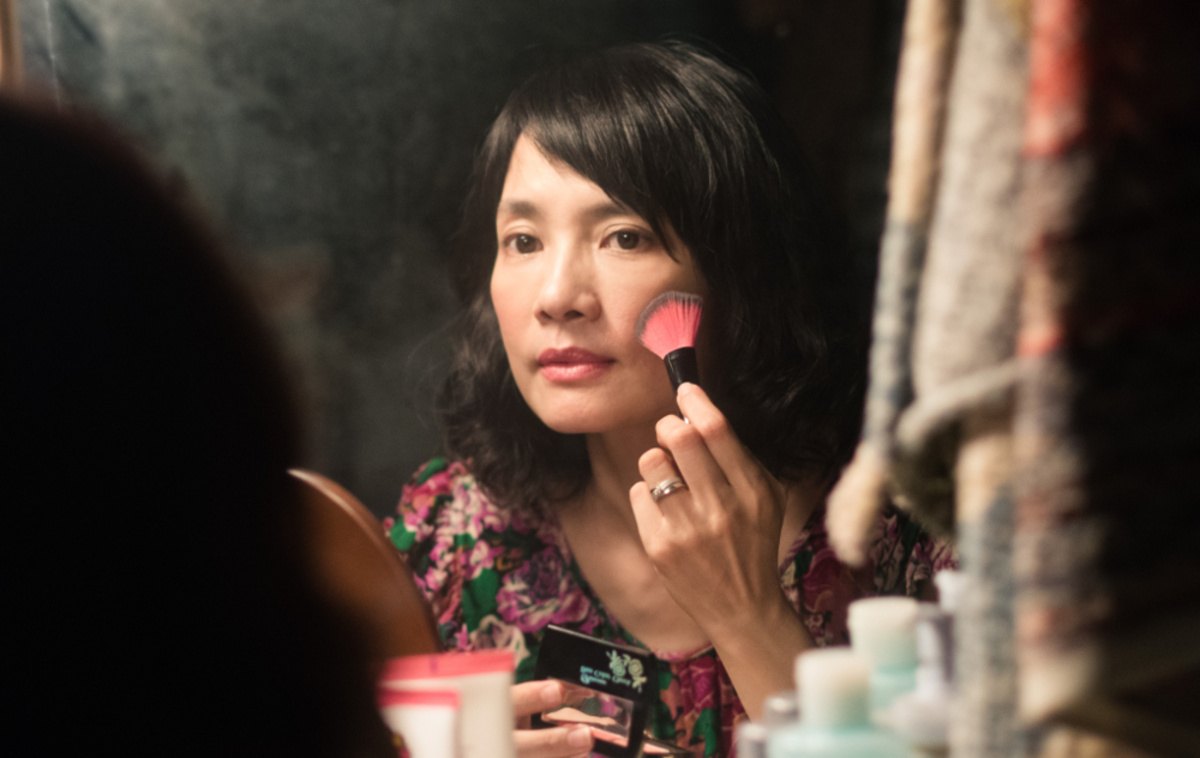 Chen Shiang-chyi in EXIT
Chen Shiang-chyi in EXITInterview with Chen Shiang-chyi who plays in "Exit" a middle-aged woman facing her solitude and first symptoms of menopause. "Exit" is presented at the 8th Five Flavours in the competition section New Asian Cinema.
Chen Shiang-chyi is a renowned Taiwanese screen and stage actress. She made her screen debut in Edward Yang's films, "A Brighter Summer Day" (1991) and "Confucian Confusion" (1994) which earned a nomination for a Golden Palm award.
She collaborated with Tsai Ming-liang on most of his full length features. She played Shiang-chyi in "What Time is There?" (2001) and "The Wayward Cloud" (2005) as well as the mother in "Stray Dogs" (2013), among others. In "Exit", presented at the 8th Five Flavours in the competition section New Asian Cinema, she portrays a middle-aged woman facing her solitude and first symptoms of menopause. She was awarded a Taipei Film Award at the 16th Taipei Film Festival (2014) for her performance in "Exit".
Emilia Skiba, Five Flavours FF: Can you tell me how did you meet director Chienn Hsiang?
Chen Shiang-chyi: It was probably about 2 years ago when director Chienn and producer Chen came to the university campus where I work. They were looking for an actress to play the lead role in their new project.
FF: What convinced you to take this part?
CS-c: That's a long, long story! It was the end of 2012. The director approached me again to ask if I was interested in taking this part. But I was not in a very good situation then, neither mentally, nor physically. I thought about it but after all I wrote to producer that it would be better if they considered someone else. I didn't think I was the right actress for this role because of my personal situation.
But one day I woke up with a thought that this production might be a good beginning for me, a chance to take a step forward. It was my personal motivation.
So I wrote another e-mail to the producer that I was ready to play the role if they hadn't found anyone else. She was very happy and replied that they hadn't found anyone else and I was still their number one choice.
FF: This story shows an interesting parallel between the film and your life.
CS-c: That's right. It was a very difficult period for me. I didn't want to play neither on stage nor act in films. "Exit" became a new beginning both for me and my acting career.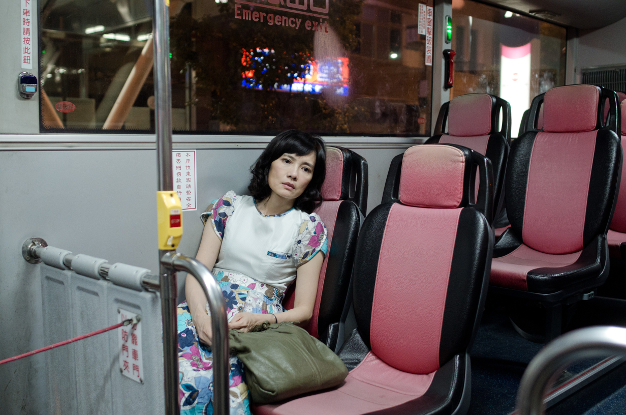 Chen Shiang-chyi in "Exit"
Chen Shiang-chyi in "Exit"
FF: So how did you work on the character of Ling? Did you have a lot of creative freedom to shape the character?
CS-c: Yes. The director is a very open-minded person and he gave me a lot of space to interpret this role. We had a lot of discussion both before and during the shooting. He allowed me to try out many possibilities while shooting various scenes.
FF: Was shooting long if there was so much discussion about the character?
CS-c: It took less than a month. But we had discussions every time a discussion was needed, both before and during the shooting.
FF: I want to ask you more about the character of Ling. She a woman who longs for strong emotions but she doesn't show it. She puts her masks on. Do you find a reference of this character to real life, to Taiwanese society?
CS-c: I think it's an average situation in Taiwan for many ordinary middle-aged women. Especially for wives, they are in a similar situation as Ling is. They suppress a lot of feelings, even for family or their own sufferings.
Before shooting I did a lot of research, I googled it and also asked my friends about this issue. They have families, they are married, but their situation was very similar to Ling's. Their personality seems to be the same, they just want to let life happen as it goes. They pretend everything is ok. The truth is they have strong desires and feelings but never express them. They feel it is natural to suppress their emotions.
FF: There are three generations of women portrayed in "Exit". You play the central character, there is mother-in-law and Ling's daughter. They are a family but they don't really support themselves...
CS-c: That's true.
FF: It seems only Ling tries to support her family but on the other hand it's also her social obligation.
CS-c: That's also true. But I think that Ling's mother-in-law is neglected by her own sons. She has two sons who are supposed to take care of her but they don't. So in a way she is abandoned, only her daughter-in-law takes care of her. Ling's daughter is the next generation and she is very different. She is a part of a very self-centred generation, she does whatever she wants. So for example she chose not to go to school. She still wants to hide it from her mother but also she desires to realise her own plan, not her social obligation.
FF: There's a short but strong scene in the film when the mother-in-law looks at Ling in silence in a very disgusted manner...
CS-c: Because she knows everything. There is no communication between them but the mother-in-law knows everything.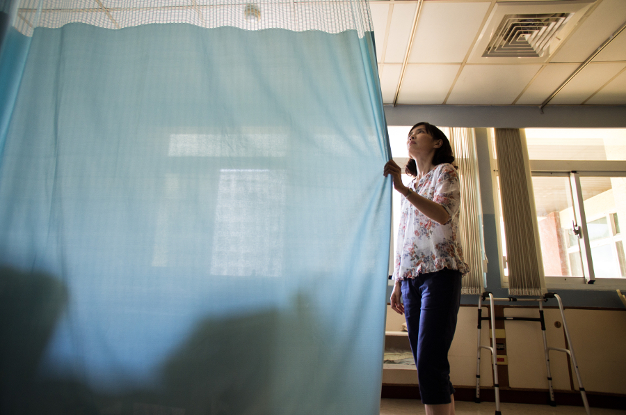 Chen Shiang-chyi in "Exit"
Chen Shiang-chyi in "Exit"
FF: When it comes to family relationships – Ling does have a husband but he lives and works in China, he never appears on the screen and Ling seems to be rather a widow. Is it also a real-life situation for Taiwanese women?
CS-c: Oh, yes. The producer sent me the link to an article about this kind of family, with the husband living in mainland China. We have a special term for people working in mainland China. We call them floating Taiwanese. Their salaries are not high, maybe just like lower middle-class, but they anyway stay in China. So you can imagine that Ling's family is not in a very good financial situation. I actually think this film reflects the present economic situation of Taiwan. Many people, especially men, go to mainland China to work and this has changed the social structure in Taiwan.
FF: And is it their choice or they economically have no choice and they're forced to choose the mainland?
CS-c: Rather both. Mainland China is a big country, it means more money and more opportunities so everybody goes there.
FF: Sounds like a story from the film industry itself – even Hollywood moves to China.
CS-c: That's right, everything moves to China!
FF: Getting back to "Exit", I'm also curious if there was anything about your character, Ling, that you liked in a special way?
CS-c: I think the last shot was especially challenging for me. Because before the shooting we didn't really know what would happen. I knew I was going to push and open the door. But we didn't have a clue what would happen during that process.
We had to be very precise because we knew that for me it could be the only chance to shoot that scene. It required a lot of emotions and energy from me. It was more of a process, a scene without a precise direction. It was hard and challenging but I liked it lot.
FF: It sounds like a totally opposite way of working on films comparing to Edward Yang with whom you made your first films.
CS-c: Yes, it was a very different experience!
FF: Can you tell me how you met director Yang?
CS-c: I was undergraduate student in the theatre department. He just came to the campus and passed by my classroom. It was an acting class and I played Hamlet. I was reciting the dialogue and he was observing me through the window without me knowing it.
A few days later I received a phone call from Edward and he said he wanted to meet me. At that time I had no idea who he was. I went to his office and he told me about his idea to shoot a film about a murder [CONFUCIAN CONFUSION]. He was looking for an actress to play one of the roles so for him that meeting was like an audition.
He also told me that he was going to shoot "A Brighter Summer Day" first and he invited me to work with him on it. It was my summer vacation and I had plenty of time so I joined that production for the whole summer. I think he observed me during that shooting, he talked with me about my character from "Confucian Confusion" – her background and her personality – and later he changed the script. He originally planned to include a murder in "Confucian Confusion" but because of my personality he changed the story. So that's how it started.
FF: So he seemed to be a person open for changes.
CS-c: Yes, he was very strict but open-minded. On the other hand, Chienn Hsiang, the director of "Exit", is very tender-minded person. You feel very secure and relaxed while working with him.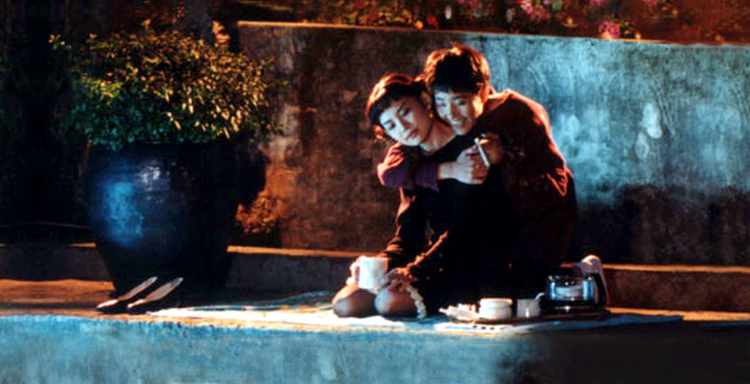 Chen Shiang-chyi in "Confucian Confusion"
Chen Shiang-chyi in "Confucian Confusion"
FF: What was your first impression of working with Edward Yang?
CS-c: It was a nightmare! It was a very intense experience every day. He was a very hard-working person and he gave us orders in a very strict way. I was very timid and originally I had only my theatrical background. So first I had to transfer my acting from theatre to cinema and I had no clue what it was about. I remember, one day we were shooting early in the morning and he gave me a lot of dialogue.
Actually, we received a new script every day – that was the way he worked. And the paper was still hot when he handed it over, the new script had been just copied.
I was so nervous on that day because in fact it was a huge monologue, it was as if playing Hamlet! But I didn't even have time to rehearse it. And shooting is a very intense situation, you have to do things right because otherwise it's a waste of time and money.
We started shooting at 5 in the morning and I just couldn't memorize the whole text and my acting was very bad on that day. He was very mad at me on that day, I can still remember it. He put all his focus on me and I ended up as a nervous wreck. But all of the sudden he said: "That's it! We're done with shooting for today." Everybody went home except for me – I had to stay at his office and practise. That was horrible, only me and the director. And I had to practise in front of him!
FF: How working with Edward Yang influenced the way you work on films?
CS-c: I think I'm more strict to myself. I became more demanding and strict because he was very demanding and strict. He had a huge influence on everyone working with him. It was a very good influence, even if some experiences were embarrassing for you as an actor.
I miss Edward Yang very much. I feel sorry I couldn't work with him on his last film, YI YI. He asked me to join that project but I was already involved in a film directed by Tsai Ming-liang at that time.
FF: How do you find working with Tsai Ming-liang?
CS-c: I think it's much easier than with Edward Yang. Tsai is also very open-minded and invites us, actors, to discuss his projects. Not only the script but also the set. For example, he invites me to go to the set with him so I could have a better feeling of it and we could discuss new ideas and emotions and how we are going to shoot them. I've learnt a lot from him.
FF: I'd want to get back to "Exit" again. What is your general feeling about working on this project?
CS-c: I was very impressed by all the work done behind the scenes. A lot of people working on the set were volunteers. I was touched by it because it was like getting back to the old times when many people worked on a film just because they had passion, they wanted to fulfil their goal. Although it refers more to the theatre because a play doesn't cost that much as a film does.
It think this dedication was influenced by the producer. She persuaded many people to work on EXIT and she herself was very committed to the project.
It was very touching for me and I think I've never worked on a film project which was based up to this extent on the volunteers' work. We didn't have a big budget for this film and I think it was our hearts and feelings what was much more important than money.
FF: I've just heard that the building you were shooting in is a haunted house.
CS-c: Oh, yes! The spirit of the house was very weird. I knew nothing about it at the beginning. But on the second day of the shooting I became very sick. It was only at the end of the shooting when people told me the building was not "clean".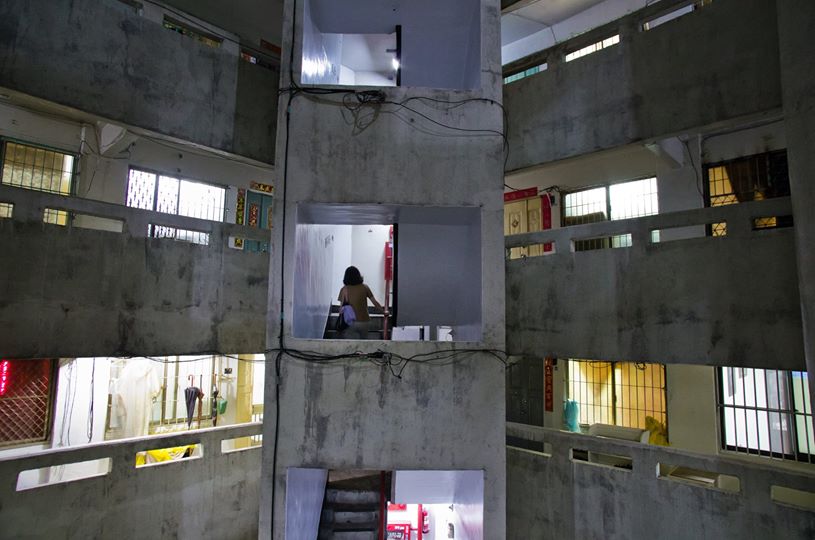 "Exit", dir. Chienn Hsiang
"Exit", dir. Chienn Hsiang
FF: Was this situation a challenging experience for you?
CS-c: Actually, I fell sick and I didn't really have much energy. To be honest, it was my first film when I was sick during shooting. But it helped me to play Ling who is going though menopause and doesn't feel well neither. It was easier for me to feel her physical situation. It was hard for me but on the other hand I benefited from it.
But also I understood Ling mentally very well. She lives in isolation and before shooting I was facing the same situation. My beloved parents passed away in the same year and I couldn't get over it. I isolated myself and I felt nothing but emptiness. I transferred all these emotions to Ling's character – we shared a lot despite our situation was different. Like Ling, I felt lonely and my relationship with family was broken. I thought that I could deal with it over time but it only got worse.
The change came with the film. When Ling pushes the door, it's like a ritual for me. I felt I was reborn thanks to this particular scene in "Exit".
When I watched this scene here at Taipei Film Festival, I couldn't stop crying. I realised that the character and me, the actress, share so much. And when Ling gets up, it's a motivation for me to get up as well.
I watched the film earlier during its international premiere at the Hong Kong Film Festival in April but I didn't experience such strong emotions then. But Taipei is my home town and I think it's why I had so different feelings about it.
Taipei, July 2014



